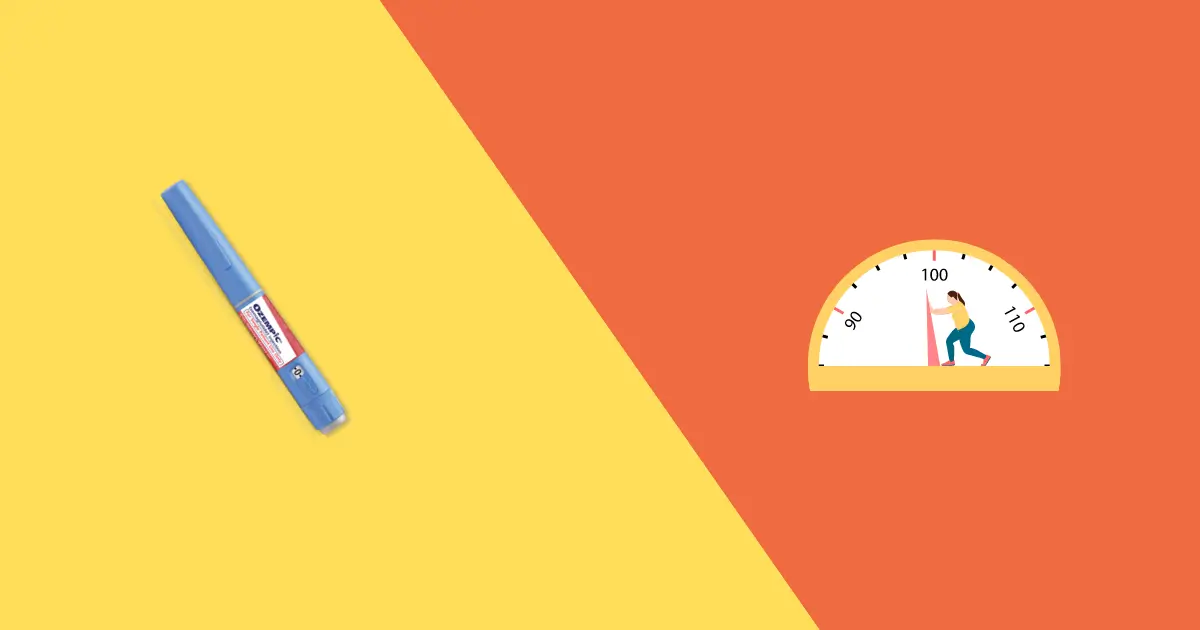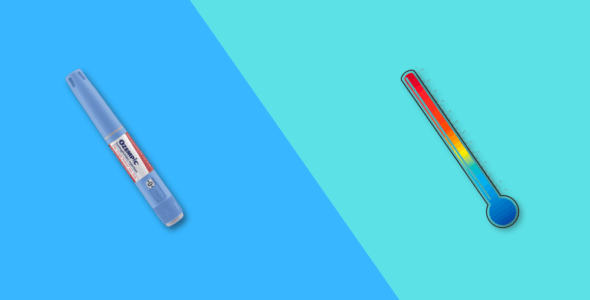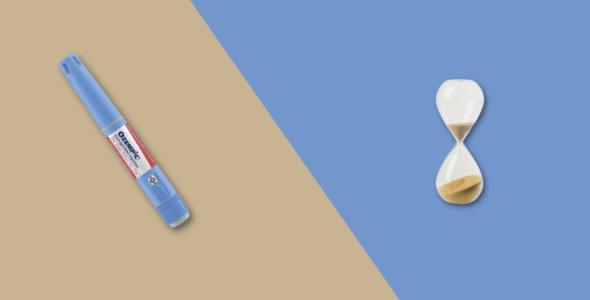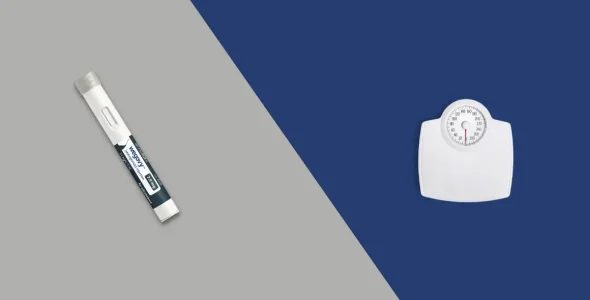Why am I not losing weight on Ozempic?
Key highlights
- Weight loss can take time and may be slower on the lower doses of Ozempic which are typically prescribed when starting the medication.
- Weight loss on Ozempic can vary from person to person depending on several factors like diet, exercise, dosage strength, modifications to lifestyle, and others.
- In clinical trials, people taking Ozempic lost an average of 13-15 lbs within the first 10 months of taking the drug.
- Consistency with medication and healthy lifestyle choices can significantly improve weight loss outcomes.
- Speak to your healthcare provider if you aren’t seeing the desired results, as they can adjust your treatment plan if needed.
Ozempic (semaglutide) is an injectable medication that has gained popularity not only for its effectiveness in managing type 2 diabetes but also as an off-label weight loss medication. By mimicking a hormone called GLP-1, which targets areas of the brain that regulate appetite and food intake, Ozempic can help you feel full longer and reduce food cravings. You’ll begin to notice a reduction in your appetite and increased satiety.
However, weight loss with Ozempic isn’t guaranteed for everyone, and some may realize slower results than expected for various reasons.
If you’re on Ozempic and not losing weight, it’s important to understand that there could be various reasons behind this such as being stressed out, not sleeping or exercising enough, your diet, or you might need your provider to change your dosage. Weight loss is a complex process influenced by many factors, and understanding these can help you optimize your approach for better results.
11 reasons why you’re not losing weight on Ozempic
If you are taking Ozempic and aren’t losing as much weight as expected, read on to learn more about the top reasons why people don’t lose weight on Ozempic. There could be several possible reasons that contribute to results that are less than desirable. Learn more about how much weight you can lose on Ozempic.
1. Weight loss takes time
Ozempic works by slowing down the digestion process which helps reduce hunger and overeating. However, weight loss won’t happen overnight. If you’ve just started taking Ozempic, be patient and give your body time to adjust.
To reduce the risk of side effects, healthcare providers will generally start patients on the lowest dosage of 0.25 mg weekly for 4 weeks before increasing to the 0.5 mg weekly dosage. Depending on how your body tolerates the medication and its side effects, your provider may gradually increase the dosage to 1-2 mg weekly, which is the suggested maintenance dosage for this medication. This titration period can take up to three months so it’s important to remain patient while your body gets used to the medication.
Tip: Set realistic weight loss goals and be patient, even if you are not taking the final dosage yet. Losing 1-2 pounds per week is generally considered safe and sustainable. Tracking your progress with weekly weigh-ins can help you stay motivated without becoming discouraged by daily fluctuations. People taking 1 mg of Ozempic began eating less after 12 weeks, according to clinical trials, and subsequently, many of the participants in the clinical trial were successful in losing weight.
2. You’re not in a calorie deficit diet
Ozempic is approved for the treatment of type 2 diabetes in combination with lifestyle changes such as a reduced-calorie diet and increased physical activity.
Even though Ozempic can reduce your appetite, you still need to maintain a calorie deficit to lose weight. This means consuming fewer calories than your body burns. Many people underestimate their calorie intake or overestimate how many calories they burn through exercise. It can be helpful to track your meals using a food diary or app to ensure you’re staying within your target calorie range.
In addition, other bad dietary choices may be hindering your weight loss efforts such as refined carbohydrates, starches, sugar-sweetened beverages, and red meat which are all known to be associated with weight gain. If you drink alcohol with Ozempic, that could also be negatively affecting your weight loss efforts.
Tip: Focus on nutrient-dense, low-calorie foods like vegetables, lean proteins, and whole grains to help keep your calorie intake in check while still feeling satisfied. There is also research that shows that eating more mindfully, without distractions, helps to focus on taking the time to eat your food, and also leads to weight loss. If necessary, speak to a registered dietician or nutritionist.
3. You’ve hit a weight loss plateau
Weight loss plateaus are a common experience and can occur when your body adjusts to a new diet or exercise regimen. Plateaus can be frustrating, but they are a normal part of the weight loss process. Your body may reach a state of equilibrium, where the rate of weight loss slows or stalls.
People generally lose weight quickly when starting to diet and exercise and notice that weight loss slows down significantly over time. This is known as the plateau, which happens when you lose too much fat and muscle simultaneously, resulting in slowing metabolism, and consequently, a reduction in weight loss.
Tip: To overcome plateaus, consider varying your exercise routine or increasing the intensity of your workouts. Hormonal changes can occur which can make you feel hungrier for high-calorie foods and Ozempic can help with these cravings. Incorporate activities that build lean muscle mass such as high-intensity interval training (HIIT) or strength training to boost metabolism and break through plateaus. Additionally, reviewing and adjusting your dietary intake may help in overcoming a weight loss plateau.
4. Not enough physical activity
Ozempic should be used in combination with a reduced-calorie diet and increased exercise. Regular physical activity is essential for weight management. Exercise helps to burn calories, maintain muscle mass, and improve overall health. The Physical Activity Guidelines for Americans recommend at least 150 minutes of moderate-intensity exercise per week, including muscle-strengthening activities two or more days a week.
While exercise alone is limited in its ability to lose a significant amount of weight, it does lead to some weight loss and is essential for keeping weight off. Studies show that people who exercise more generally lose more weight, especially in conjunction with a lower-calorie diet.
Tip: Incorporate a mix of aerobic exercises, such as walking, cycling, or swimming, and strength training exercises to support weight loss. Choose activities that you enjoy to increase the likelihood of sustaining your exercise routine. Setting achievable exercise goals and gradually increasing the intensity can also help improve overall fitness and support weight loss. Exercise can help speed up your metabolism, especially with certain types of exercise like combining resistance training and aerobic exercises which help build muscle mass while losing fat.
5. Not taking the medication as prescribed
Consistency is key to maximizing the effectiveness of Ozempic. This medication is administered once a week, and adhering to the prescribed schedule is essential for optimal results. Missing doses or not following the recommended dosage can significantly reduce the medication’s benefits. Studies indicate that maintaining regular usage is crucial for achieving the desired outcomes in weight management.
The half-life of Ozempic (the amount of time it takes for a drug in your body to reduce by half) is known to last about one week, which is around the same time as you are supposed to take your next dose. Pharmaceutical manufacturers use dosing schedules based on a medication’s half-life to optimize the drug’s efficacy. For this reason, if you regularly skip doses of Ozempic, the medication may not work as intended.
Tip: To ensure that you never miss a dose, consider using a medication tracker app or setting reminders on your phone. This approach can help you stay on track with your weekly injections and ensure you’re receiving the full benefits of Ozempic. Follow any lifestyle changes your healthcare provider recommends, including changes to your diet and increased exercise. Consistency with taking the medication, combined with healthy lifestyle choices, enhances the likelihood of achieving your weight loss goals.
6. Other medical conditions
Certain medical conditions can interfere with weight loss, even when using Ozempic. For example, you might be taking other medications that cause weight gain, or you might have other medical conditions such as hypothyroidism, sleep apnea, and chronic insomnia which can affect metabolism and hormone levels, making weight management more challenging.
If you have type 2 diabetes, which Ozempic is FDA-approved to treat, you may lose weight slower than people who are taking Ozempic solely to treat obesity and do not have type 2 diabetes. A study showed that after three months of taking semaglutide (the active ingredient of Ozempic), people without type 2 diabetes lost 6.3% of their body weight on average, compared with 3.9% weight loss for people with type 2 diabetes. At six months, those without type 2 diabetes had lost 11.8% of their weight and those with type 2 diabetes lost 7.2% of their weight. The primary reason is that for people with type 2 diabetes, the ability of the body to respond to GLP-1 and stimulate insulin secretion is reduced. While GLP-1 helps to control blood sugar levels by stimulating the pancreas to release insulin after meals, this response may be less potent than in people without diabetes.
Tip: If you have an existing health condition, discuss it with your healthcare provider. Proper management of these conditions, including possible medication adjustments, can enhance the effectiveness of Ozempic in supporting weight loss. Your provider may need to tailor your treatment plan to account for any underlying health issues.
7. You may need a higher dosage of Ozempic
Ozempic may cause certain gastrointestinal side effects such as nausea, bloating, or constipation, which are dependent on the dose of Ozempic you are taking. These side effects are more common with higher doses of the drug, especially when you start taking Ozempic. These side effects typically go away or lessen with time as your body gets used to the medication.
People on higher doses of Ozempic will typically lose more weight than people on lower doses. Studies show that people on the 1mg strength of semaglutide lost an average of 7% of their body weight on average within a year. However, individual results can vary by person and there are several contributing factors including diet, exercise, and other factors we have mentioned in this article.
Tip: Consult your healthcare provider if you experience significant or persistent side effects while increasing your dose according to the prescribed dosing plan. They may recommend dose adjustments or additional strategies to manage these symptoms effectively. Addressing side effects can help you maintain your commitment to weight loss and optimize the benefits of Ozempic.
8. Not enough protein and fiber in your diet
Although Ozempic helps with appetite control, the quality of your diet and healthy eating habits remains crucial for weight loss. Certain foods such as protein and fiber can help accelerate weight loss by increasing feelings of fullness. Eating foods that are high in protein and fiber can help you feel full faster and contribute to eating less and losing more weight as a result.
Adults should get around 10-35% of their total daily calories from protein and it is suggested to target the higher end of that scale.
Incorporate into your diet some of these foods which are good sources of protein:
- Meat
- Poultry
- Fish
- Eggs
- Milk
- Tofu and tempeh
- Soy
- Lentils
- Beans
- Quinoa
- Legumes
- Nuts
For adults younger than 50, experts recommend 25 grams of fiber daily for women and 38 grams daily for men. For adults above 50 years old, experts recommend 21 grams daily for women and 30 grams for men.
Incorporate into your diet some of these foods which are rich in fiber:
- Fruits (with the peel; that’s where the fiber is)
- Beans
- Vegetables
- Seeds
- Legumes
- Nuts
- Whole grains, like barley and oat
Tip: Prioritize a diet rich in protein and fiber. Working with a nutritionist can help you develop a meal plan that aligns with your weight loss goals and supports overall health.
9. Stress and hormonal factors
Chronic stress can impact weight loss by increasing cortisol levels, which is associated with weight gain, particularly around the abdomen. Regular chronic stress from personal issues or work can lead to weight gain. Obesity itself can also be a stress factor. The more stress factors you have, the more weight you may gain.
Stress can lead to gaining weight in several ways such as not having time to prepare healthy meals, not exercising regularly, and eating more sugary, calorie-dense foods that hinder weight loss efforts. Stress can also affect your hormone levels which can impact how hungry you feel and the foods you crave.
Stress can also negatively affect your sleep, which we will expand on below.
Tip: Incorporate stress management techniques into your routine, such as meditation, yoga, or deep breathing exercises. Effectively managing stress can help regulate cortisol levels and support your weight loss journey.
10. Sleeping
Studies have shown that sleeping too much or too little can result in weight gain. People who sleep less than six hours or more than eight hours are more likely to gain weight in the long term.
People who sleep too little are known to experience hormonal changes that make them feel hungrier and increase cravings for unhealthy high-calorie foods and refined carbohydrates.
People who sleep too much (for example, more than ten hours daily) are known to have a higher risk of obesity and other weight-related health conditions such as hypertension (high blood pressure) and diabetes.
Tip: Prioritize good sleeping habits for better health. Most adults need at least seven hours or more of sleep daily.
11. Not the right medication for you
Ozempic may not be the ideal solution for everyone. If you’ve been using Ozempic consistently but are not seeing the desired weight loss results, it might not be the best medication for you. Alternative GLP-1 medications like Wegovy (semaglutide) or tirzepatide (Zepbound or Mounjaro) may offer better results.
Zepbound (tirzepatide) is a weekly injectable medication that is approved for weight loss in patients with obesity or overweight and weight-related health conditions like heart disease or high blood pressure. In clinical trials, patients on Zepbound lost between 15%-21% of their body weight within a year and a half, with an average of 35–52 lbs, which is significantly more weight loss than people on Ozempic will experience on average.
In another study comparing Ozempic and Zepbound directly, the weight loss achieved on the 5 mg Zepbound dosage was similar to the weight loss achieved on the highest 2 mg Ozempic dosage. As well, people who took 10 mg and 15 mg dosages of Zepbound lost significantly more weight.
Tip: Consult with your healthcare provider to explore other treatment options if Ozempic is not providing the desired weight loss results. There are several other weight loss drugs available. Your provider can help assess whether an alternative medication or approach might better suit your weight loss needs.
How to make Ozempic more effective for weight loss
To maximize the effectiveness of Ozempic and achieve your weight loss goals, consider integrating the following healthy habits:
Diet
Combining Ozempic with a healthy diet is crucial. The most important factor for weight loss is eating fewer calories than you burn. It is recommended to reduce your caloric intake by 500 calories per day and aim for less than 1,500 calories per day, or what your healthcare provider recommends.
Focus on nutrient-dense foods and maintain a calorie deficit. A balanced diet rich in vegetables, lean proteins, and whole grains supports overall health and helps manage your body weight more effectively. Avoid or limit sugary, salty, fatty foods, processed foods, and red meat. Limit late-night-snacking which can lead to unwanted weight gain and hinder your sleep cycle. Eat smaller portions and always try to slow down while eating.
This approach aligns with the appetite control induced by Ozempic and promotes sustainable weight loss.
You can consider working with a registered dietitian to develop a meal plan that aligns with your weight loss goals and ensures nutritional adequacy. A dietitian can help you manage calorie intake and make informed dietary choices, which are essential for maximizing the benefits of Ozempic.
Exercise
Regular physical activity is key to enhancing weight loss and supporting overall health. Aim for at least 150 minutes of moderate-intensity exercise each week, incorporating both aerobic and strength-training activities. Exercising for longer can lead to more weight loss. Experts recommend at least 200 minutes per week of physical activity to prevent weight gain and maintain weight loss while using Ozempic.
Aerobic exercises, such as brisk walking or cycling, boost cardiovascular health and calorie burn, while strength training helps build muscle and improve metabolic function. Combining these exercises with a balanced diet and medications like Ozempic will improve your ability to achieve and maintain a healthy weight and promote overall well-being.
It’s essential to start with any amount of exercise and even smaller amounts of exercise can help prevent additional weight gain. Getting started with an exercise routine will make it easier to develop the habit that can lead to more exercise and subsequently, more weight loss. You can get started by simply walking 2,000 steps per day (around 30 minutes – 1 mile). Following a routine will help you sustain the healthy habit and exercise will become a regular part of your lifestyle.
Resistance training helps build muscle mass and keeps your metabolism working, but aerobic, resistance, and flexibility exercises can all offer health benefits.
Healthy habits
In addition to maintaining a healthy diet and exercise routine, you should consider other healthy habits to assist with your weight loss. For example:
- Don’t smoke or drink alcohol.
- Establish a stress management technique such as yoga, meditation, and deep breathing exercises.
- Aim for 7-9 hours of sleep each night to regulate hunger hormones and support metabolic health.
- Stay hydrated as it can help relieve some of the common side effects of Ozempic (nausea, diarrhea, or vomiting) and can also help with weight loss.
- Seek support from family and friends. Research shows that support from family and friends who support your weight loss efforts can help you lose weight and spending time with people who don’t eat healthy or exercise (or criticize you) can hinder your progress and lead to weight gain.
- Find a “weight loss buddy” who can help you achieve your weight loss goals. In a 15-week study, people who had a “weight loss buddy” lost more weight than others who didn’t.
Speak to your provider
Speak with your healthcare provider if you are concerned that you are not losing enough weight on Ozempic. They can assess your progress, identify potential reasons for any weight loss plateau, and consider adjustments to your treatment plan. This may include changing your dosage or exploring Ozempic alternatives such as Wegovy or Mounjaro, which are also known for their effectiveness in weight loss.
Keep detailed records of your diet, exercise routine, and any changes in your health status. Providing your healthcare provider with this information can help them understand your situation better and make informed decisions about your treatment plan. Try the strategies recommended in this article to see if they make a difference while being patient and enjoying the process.
Bottom line
Ozempic can be an effective tool for weight loss, but its success is influenced by various factors. Combining the medication with a balanced diet, regular exercise, and healthy lifestyle choices will enhance your chances of achieving significant weight loss. Patience and consistency are key, and working closely with your healthcare provider can help tailor your approach for optimal results. Remember, weight loss is a personal journey, and finding the right balance for your body is essential for long-term success.














